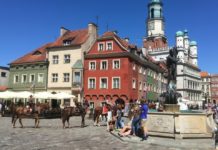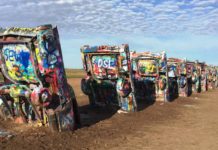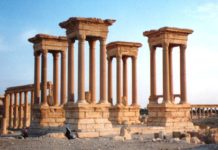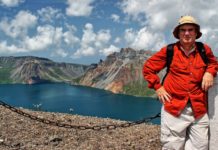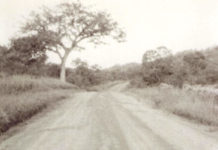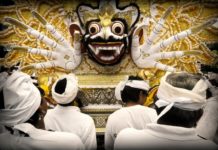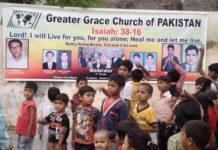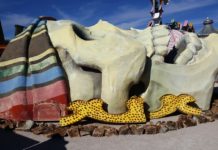CHAPTER 15
Ambush in the night. All guns aiming at me. – “Ambush in the Night” by Bob Marley and the Wailers (1979)
After camping for two nights at Murchison Falls National Park, we hitchhiked 200 miles to Kampala and arrived in a nice clean city with tree-lined avenues and beautiful rolling hills in the distance. With no luck finding a suitable hotel or youth hostel, we opted for the YMCA. Despite having only dorm room accommodations, it was conveniently located in the center of town.
Although many of the shelves were empty, the local grocery store had more food choices than I’d seen in a long time. The fresh fruit didn’t look so good, but other things like canned peaches, sardines, tuna, and even the familiar cans of Danish ham were plentiful.
On our second day in Kampala, we ran into Bob and Gordon walking down the main street. They’d also stayed at the YMCA but were now renting a room in a private home. An Indian woman named La Bubann was the owner, and she lived there with her two young children. Gordon said there was plenty of space, suggested that we join them, and assured us it would be more comfortable.
The simple house was situated on a narrow, unpaved side street in a crowded, dingy neighborhood filled with single-family dwellings. For five U.S. dollars a day, we crashed on the floor of Bob and Gordon’s room and got a home-cooked breakfast.
“My dad sent the conscientious objector application and requested that I fill it out immediately.”
Although her weathered skin and calloused hands made her look much older, I figured that La Bubann was probably in her forties. She had long jet black hair which she wore in a ponytail, and her eyes were dark and gentle. A long flower-covered dress was wrapped around her slender body, and she had a red dot in the middle of her forehead. We learned that her husband had recently died of a health ailment, but she didn’t elaborate on the specifics.
During the days of British Colonial rule, her parents moved from India to Uganda. La Bubann and her children, Ryan and Anya, were all born in Kampala. Even though none of them had ever been to England, they were British citizens with British passports.
Inside the three-bedroom house, the facilities were primitive. The toilet was just a tile-covered stall that had a shower, water faucet, and a hole in the floor which was used as a drain. I spent a lot of time in the bathroom because I was suffering from painful stomach cramps and violent diarrhea that was probably caused by drinking so much water from the Nile River.
The best part about staying at La Bubann’s was the breakfast. Each morning she got up at dawn, sat cross-legged on the patio, and cooked homemade chipatis. Ryan and Anya helped her pat the floured dough balls into flat round shapes resembling a tortilla. Having them served hot with butter, marmalade, and a nice cup of coffee was a great way to start the day.
When I visited the American Express office, much to my relief, I did not have a letter from the Selective Service. However, my dad sent the conscientious objector application and requested that I fill it out immediately. The form was complicated, and I was overwhelmed by its questions and lengthy requests for documentation. They even asked for the name and address of my church and minister along with letters of support from him.
I faked my way through the application, but there were a lot of blank spaces when I was finished. At the end of the form, I wrote an addendum explaining that I’d provide the rest of the required paperwork when I returned to the United States.
“Many of the locals we met were afraid to say anything bad about Idi Amin because they weren’t sure who might turn them in.”
Afterwards, Ted and I got our visas at the Kenyan Embassy. Next I visited the American Embassy, hoping that I might get lucky and meet someone as cool as the Consul in Khartoum. If so, I thought I would make an effort to talk frankly to them about my draft status.
As it turned out, the people I encountered at the embassy appeared surprised and jumpy at the sight of me. The mood was tense in Uganda and there were isolated reports of attacks against Peace Corps workers and human rights activists whose actions had put them on the wrong side of Idi Amin’s forces. When I thought back to the rides we took from military vehicles, it sent chills up my spine.
One of the embassy’s employees said cryptically, “Be careful here in Kampala. It isn’t good for Westerners to get in any kind of trouble.”
When I told Gordon about what I had heard, he didn’t seem the slightest bit concerned.
“Aww, weird shit always happens around the equator,” he remarked.
“What do you mean?” I asked, not knowing that we were even near the equator.
“Oh, you know, there’s always a strange vibe here,” he continued. “Maybe it’s an old wives’ tale, but I’ve heard about things like, you know, the water goes down the drain in the opposite direction.”
I was aware that I had arrived in Kampala at a pivotal time in Uganda’s history. The story was simple: A year ago, Idi Amin had taken power in a violent and brutal military coup. I read in a news magazine that he’d said his full name was Big Daddy General Idi Amin Dada. He had given his police force complete authority to kill thousands of people who were mostly rivals of his own tribe, the Kakwa. Ironically, Big Daddy was from one of the smallest tribes in Uganda. Each night at sunset, loudspeakers all over the city blared his speeches.
I heard stories about people getting picked up and never being seen again. The thugs who did Amin’s dirty work were known for murdering his enemies in particularly violent and painful ways as a warning to others not to cross them. Many of the locals we met were afraid to say anything bad about Idi Amin because they weren’t sure who might turn them in.
“Since I’d bought pot from lepers, I didn’t bat an eye at the idea of scoring from Pygmies.”
La Bubann told us that Amin’s minions conducted vicious attacks on members of the local Asian community. Even worse, he had recently shocked everyone by ordering all Asians in Uganda with British passports to leave within ninety days. Thousands of people who were born here now had only weeks to leave, and would be permitted to take only what they could carry with them. It was a cruel and frightening turn of events for families like La Bubann’s. She and her children had never known any home other than Uganda.
Ted and I wished that we could think of a way to help, but there was nothing we could do. Her only option was to go to England, but for a widow with no skills and two children to support, moving to an unfamiliar country that didn’t want her was a terrifying thought.
Fortunately, Gordon had discovered a good source of marijuana in Kampala. A guy we’d both met at the YMCA was buying weed from the local Pygmies. Since I’d bought pot from lepers, I didn’t bat an eye at the idea of scoring from Pygmies. I warned Gordon about what I was told at the U. S. embassy, and we both agreed to not light up anywhere in public. La Bubann didn’t seem to mind the sweet smell of herb coming out of our room, but we kept it to a minimum when the kids were around.
Since we were nearing the end of the two-week period that we’d been granted by the border Nazi, we visited the Department of Immigration to get our visas extended. Without any fuss, our two-month extensions were approved. We then felt relaxed enough to enjoy ourselves.
“Crazy thoughts were racing through my head. Where the hell were we?”
In the evening, we’d hang out at a bar in town that was frequented by a lot of young people. On most nights, we’d party until early in the morning and stagger home. As usual, Ted had great luck with the girls. He caught the eye of Catherine, the daughter of a local British businessman. They spent a lot of time together and some nights he’d even stay at her house.
One morning, I stumbled home after a night of drinking, got undressed, and settled into my sleeping bag. Suddenly, I heard all hell break loose. Someone had smashed through the front door of the house, then they kicked in the door to our room. The lights came on, and Bob, Gordon, Ted and I bolted upright. Standing in front of us were four African men in civilian clothes. I knew right away that they were Amin’s secret police.
They waved their machine guns around and one of them yelled, “Where are your guns?”
“We don’t have any guns!” we shouted in unison.
“We’re American tourists!” I screamed.
Out of the corner of my eye, I saw our stash of marijuana sitting out in the open. Thankfully, as they tore the room apart looking for weapons, they ignored it. My heart was pounding so hard that I was gasping for air. I tried to think of a way to stabilize the situation, but I was frozen with fear.
Then, coming from the next room, I heard the horrendous sound of La Bubann being beaten. Her howling and crying were absolutely heartbreaking. But we had more immediate concerns. As one of the thugs was searching our stuff, he knocked over Gordon’s guitar.
Gordon yelled, “Hey watch it, will ya!”
The man shot him an evil glare, swung his gun around, and pistol whipped him in the face. Gordon fell to the floor, groaned loudly, and blood began gushing out of his nose and mouth.
The four of us were marched out of the house at gunpoint. Ted and I were shoved into the back seat of a small Fiat; Gordon and Bob were pushed into another. The car raced down the bumpy dirt road at frightening speed. The shacks and houses flew by so quickly, they were nothing but a blur. After we got out of Kampala, the driver made an abrupt left turn and headed straight into the jungle.
The man in the passenger seat turned around and sneered, “You think we are stupid Africans, but we know who you are and what you are doing here!”
“Hey, what are you talking about? We’re just tourists,” I said adamantly. “We haven’t done anything wrong!”
“We know you are Israeli spies,” the driver declared with contempt, “and we are going to kill you!”
With mouths wide open and eyes filled with terror, Ted and I both yelled at the same time. “We’re not spies! We’re tourists!”
“I’m American, and he’s Canadian!” I cried. “We’re not Israeli!”
Nothing we said made a difference. I begged them to let us call the American Embassy, but my pleas were ignored. As the wild ride continued through the thick jungle, Ted and I huddled closely in the cramped back seat. We had no idea where we were going or if we would get out of this alive.
Out of nowhere, a large, gated military complex appeared. The car made a sharp right turn and screeched to a halt in the main yard. The compound consisted of several one-story brick buildings; it looked like it might have once been a school. Soldiers were everywhere, and they stopped what they were doing to leer at the new prisoners.
With guns at our backs, the four of us were brought to the closest building. Once inside, they took us all in different directions. I was led to an empty room, ordered to sit on the floor, and await further instructions.
The room had white walls, two small windows, and no furniture. As I anxiously waited on the rough wooden floor, I noticed blood stains splattered on the walls at the precise level of a seated person’s head. I knew exactly what it meant, and it was terrifying.
For hours, I sat in the room and strained to hear anything outside the door. Occasionally, I’d hear men conversing or shouting to each other in an African dialect.
Crazy thoughts were racing through my head. Where the hell were we? What were they going to do to us? Why did they think we were spies? Did the people I drank with last night notify them? Had the secret police followed me? Maybe La Bubann was the spy that they were looking for. Maybe they thought we were working with her.
The door flew open, and a uniformed soldier came in with the two plainclothes men who had been in the Fiat. When they saw me on the floor cowering against the wall, evil smirks crossed their faces.
The soldier scowled before barking at me, “What is your name, and what is your business in Uganda?”
“My name is Gregg Cockrell,” I stated as I slowly stood up. “I’m an American citizen, and I’m here as a tourist.”
“I want the truth!” he bellowed.
He came within inches of my face and sneered, “You’re a spy, aren’t you? We know that you and your friends are spies for Israel.”
I tried to back away from him, but there was nowhere to go.
“I am not a spy,” I stated evenly, trying not to antagonize him, “and I would like to call my embassy.”
“You will do what we tell you to do!” the soldier retorted.
“We know how to deal with spies,” he said, and he half-smiled in a way that I’ll never forget. It was a cruel, chilling, demonic look that scared the shit out of me.
One of the goons brought in a chair and slid it across the floor to me. They left the room, slamming the door behind them. I slunk down into the chair and waited for whatever terrible thing might happen next.
Two hours later, a second uniformed soldier came in and casually flipped through the pages of my passport in silence. He appeared to be a higher-ranking soldier than the previous one and looked equally threatening.
“What brings you to Uganda?” he inquired in a normal tone of voice.
He spoke better English than the first soldier who interrogated me, and I sensed that he was smarter, too. I was also grateful that he wasn’t shouting.
“I’m an American tourist,” I replied. “I’m just here visiting the country.”
“Where have you been since you arrived?”
“I’ve been to Murchison Falls.”
“And why are you not staying in one of the hotels in Kampala like most tourists?” he asked pointedly.
“Well, we wanted to save some money, so we rented a room from a woman we met.”
“Why do you not have very much money if you are here for tourism?” he interrupted.
“Well, I…”
“How much money do you have with you?”
“About seven hundred dollars.”
“And how much money do your friends have?”
“I don’t know,” I answered. “You’d have to ask them.”
“That is plenty of money to stay in a hotel, so why do you live with this Asian woman?” he asked with his voice getting louder.
“Well, we…”
“What else are you doing in Uganda?”
“Nothing. We are just traveling through as tourists on our way to Kenya.”
“Where in the United States are you from?” he asked.
“I’m from California.”
“California? Hollywood?”
“Near there,” I replied. “Los Angeles.”
“What kind of work do you do in Los Angeles, Mr. Cockrell?”
“Well, I was an electric shaver repairman,” I responded as I gestured with my hand like I was shaving.
“And what does your father do in America?”
The guard leaned in so close for the answer, I could smell his acrid breath.
“He sells real estate.”
His face twisted into a quizzical look. I assumed he didn’t understand what real estate was, and I didn’t bother to explain it.
“How much money do you make in America as a shaver repairman?”
“Umm…”
“What kind of car does your father drive?”
“What kind of car?” I asked incredulously.
“Yes. What kind of car?” he repeated with exasperation.
“Uhh, he drives a Chevy.”
I wasn’t sure if this man had ever even seen a Chevy.
He gave me a suspicious look, turned around, and left the room.
Alone again, I wondered if the others were being asked the same weird questions. I sat quietly for another couple of hours before the door opened, and a third uniformed soldier walked in.
“Hello,” he greeted me sternly.
“Hello,” I politely replied.
“When did you come to Uganda, Gregg Cockrell?”
“About two weeks ago. I think it was around July 23rd.”
“And what is the purpose of your visit?”
“I’m here with my friends as tourists. We are here to see the country.”
“How much money have you spent since arriving?”
“I guess about fifty dollars or so.”
“And what have you bought?”
“Well, mostly food and stuff like that.”
I wasn’t exactly sure what he wanted to hear, so I simply stuck to the truth.
“I see you applied for an extension to your visa,” he commented. “Why do you want this extension? How long do you plan on staying in Uganda?”
“Well, I don’t know,” I replied. “I just wanted to stay more than two weeks.”
After that answer, he abruptly left the room. Maybe I’d said the wrong thing. I was left alone for a few hours sitting on the hard, uncomfortable chair with awful thoughts racing through my head. It was pure psychological torture.
Suddenly, a lightning bolt went off in my brain, and I understood why they thought we were spies. Since arriving, nothing we had done was the typical behavior of tourists. We had left war-torn Sudan, entered Uganda at a remote border post, applied for extensions to our visas, and were staying in the home of an Asian woman who we didn’t know.
These soldiers couldn’t fathom young guys like us kicking around and doing what we pleased with no agenda or schedule. Our movements were not normal, and they’d probably been watching us the entire time.
Although Kampala did not have a curfew, it was poor judgement for me to walk around drunk in the middle of the night. No wonder they picked us up and dragged us off into the jungle. It made perfect sense, and I was stupid for not figuring it out.
The door opened, and a fourth uniformed soldier entered the room. He handed me a pencil and plain piece of lined notebook paper.
“I want you to write a complete record of everything you have done, everywhere you have gone, and who you have visited in Uganda, Mr. Cockrell,” he demanded. “Write about all money you have spent and what you have bought. Write about what your business is and when you plan to finish that business.” Then he walked out.
In my neatest handwriting, I began to write down everything he asked for. I was careful not to be sarcastic or to make it look like I wasn’t taking him seriously. Using both sides of the paper, I tried to detail whatever I had done. I highlighted anything touristy, like visiting Murchison Falls, but I left out the part about buying marijuana from the Pygmies and sleeping with one of the local women. Two hours later, he returned, collected the piece of paper, and left without saying a word.
A fifth uniformed soldier walked in, followed by the previous two soldiers I had dealt with. One of them had my passport in his hand along with the piece of paper I had written my report on.
“Mr. Gregg Cockrell, you are here in this country as an American tourist only, is that correct?”
“Yes, that is correct, sir.” I replied respectfully.
“And when do you plan on leaving Uganda, Mr. Cockrell?”
“Well, uhh, pretty soon I think. Maybe tomorrow, actually.”
“I think that would be a good idea, Mr. Cockrell,” he enunciated as he looked in my eyes and handed me my passport.
Like officially trained soldiers, they turned around in formation and stepped out of the room. The men from the Fiat walked in and motioned for me to step outside. In the corridor, I saw Ted come out of a door with a soldier. Farther down another hallway a couple of soldiers were leading Bob and Gordon. They shoved us into the same Fiats and drove at breakneck speed back to Kampala.
“I couldn’t understand why Ted neglected to mention such an important piece of information.”
Ted and I did not utter a word during the entire ride. By the time we pulled up in front of La Bubann’s house, it was almost 9:00 p.m. We’d been held for nearly fifteen hours.
Ryan and Anya were nervously standing in their neighbor’s front yard. They watched intently as the four of us got out of the Fiats. The drivers gunned their engines, zoomed away, and left us behind in a huge cloud of dust. For several seconds, we just stood there in silence.
“Holy fuck!” I yelled.
“Those motherfuckers!” Ted screamed, “I really thought they were going to kill us!”
“Gordon, you OK?” I asked, looking closely at his face where he had been hit.
“Yeah, fuck those guys, I’m all right,” he muttered while nursing the wound.
Looking at the kids, Ted asked, “What happened to your mother?”
La Bubann’s children were shaking, but they told us rather calmly that she wasn’t badly hurt and would be home shortly. In the meantime, they were staying with friends in the neighborhood.
“I never told you guys,” Ted said, “but those men were the same fuckers that hassled me two nights ago, when I was coming home from Catherine’s. They questioned me about what I was doing out at such a late hour. Then they forced me into a car and drove me to a place they said was a hospital, but it was filled with a bunch of soldiers.”
“They interrogated me,” he continued, “and then they let me go. One plainclothes guy put his pistol to my head and said ‘start walking.’ I swear I thought he was going to shoot me!”
I couldn’t understand why Ted neglected to mention such an important piece of information. Then I realized that it had been a couple days since we’d seen each other because he’d been staying at Catherine’s house. Maybe I was better off not hearing about it until after the fact.
When I went inside, I saw that the house had been totally ransacked. Suddenly, I felt sick. My stomach screamed with cramps, and I ran to the bathroom where I had an episode of explosive diarrhea, and threw up.
As we put our belongings back together, the four of us talked about what to do next. I suggested that we all leave as soon as the sun came up.
“No way!” Gordon said angrily. “I’m not leaving yet! Fuck those guys. I’m going to see Murchison Falls. I’ll leave when I’m fucking ready to leave, not when they tell me to leave.”
“Yeah, me too,” Bob agreed. “We’ve got plenty of time left on our visas, and the chances of us getting into trouble again are pretty slim.”
I looked at him in disbelief. “Well, I think you’re fucking crazy, man. Those motherfuckers could have killed us! If they decide tomorrow to kill us, they’ll do it in a second. How much more of a warning do you need?”
“I’m not ready to go yet because of a few punk thugs who don’t even wear a uniform!” Gordon angrily replied.
I could not believe what I was hearing. Ted and I wasted no time and packed up our shit. We were finished with Uganda and heading to Kenya first thing in the morning.


